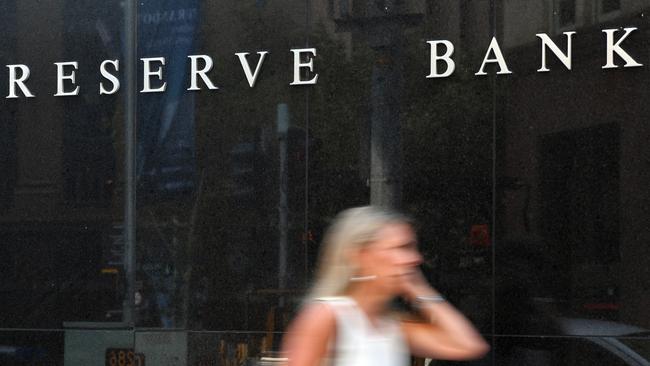Financial stress could be magnified if economic conditions deteriorate further than anticipated, RBA warns
The RBA says financial stress would be magnified if economic conditions deteriorate further than anticipated and inflation and interest rates were to stay high for longer than expected.

Business
Don't miss out on the headlines from Business. Followed categories will be added to My News.
Risks to the Australian financial system from lending to households, businesses and commercial real estate remain contained, according to the Reserve Bank’s latest financial stability review.
Budget pressures from high inflation and restrictive monetary policy continue to be felt across the community but the share of borrowers experiencing severe financial stress “remains small”.
The biannual health check on the financial system found a “small but rising” share of Australian households are falling behind on mortgage repayments, but the “vast majority” of borrowers are still able to service their debts and most have maintained, if not added, to their mortgage buffers.
The RBA board left rates on hold as expected this week. However, for the first time since March it didn’t discuss the case for a rate hike.

Many businesses continue to manage pressure on their cash flows and balance sheets, supported by their strong financial positions prior to the rise of inflation and interest rates.
But many others, small businesses in particular, still struggle with “challenging financial conditions”.
The report does note that insolvencies have increased sharply since the removal of pandemic-era support, though they are only slightly above pre-pandemic levels as a share of all businesses.
Financial pressures are expected to ease in the period ahead, but the economic outlook is highly uncertain. Budget pressures are expected to ease as inflation moderates further and Stage 3 tax cuts take effect, but an expected easing in labour market conditions and subdued growth in activity will be “challenging for some households and businesses.”
Financial stress would be magnified if economic conditions deteriorated further than anticipated and if inflation and interest rates were to remain high for longer than expected.
However, at this stage the risk of widespread financial stress remained “limited” by a generally strong financial positions of most borrowers. Very few mortgage borrowers were in negative equity, limiting the impact on lenders to defaults and supporting their ability to keep providing loans.
Most businesses that have entered insolvency are small and have little debt, limiting the broader impact on the labour market and thus household incomes, and on the capital position of lenders.
But the review warned that domestic vulnerabilities could increase if households respond to any easing in financial conditions by taking on excessive debt.
“Historically, periods of low and/or falling interest rates have coincided with borrowers taking on higher levels of debt and, in some cases, lenders extending credit to riskier borrowers,” it said.
“This could be magnified if lending standards drop.”
It cautioned that the international experience has highlighted the danger of boom-bust asset price cycles, particularly those amplified by the widespread use of borrowed money, as was the case in the global financial crisis. Residential property “stands out in this regard.”

As for the commercial real estate market which has struggled since the pandemic, conditions in some segments “remain challenging”, but the financial stability risks in Australia “remain contained.”
Despite large declines in asset valuations over the past couple of years, overall indicators of financial stress in the Australian commercial real estate market are “low by historical standards”, the review said.
The review saw a risk of stress in overseas CRE markets spilling over to Australian market conditions via interconnected sources of ownership and funding, noting that it “could lead to losses for some investors and non-bank lenders”. But it was unlikely to materially affect the asset quality of domestic banks given their relatively limited CRE exposures and conservative lending standards to the sector.
On a global level, the review said continued economic resilience is “by no means assured”, even as easing inflation is expected to support corporate and household balance sheets and cash flows.
Central banks in most advanced economies are cutting rates, but a significant economic downturn, including a sharp deterioration in labour markets, is seen as the main risk to the resilience of borrowers. The US Federal Reserve started easing with a jumbo-sized 50 basis points cut last week.
“The sizeable capital buffers maintained by large banks worldwide position them well to handle rising loan impairments in such a scenario and continue supporting the economy,” the RBA said.
“However, threats originating from outside the financial system – including geopolitical risks and risks associated with climate change – also continue to increase and have the potential to adversely interact with vulnerabilities in the global financial system.”
The review identified three global vulnerabilities as having the most potential to significantly impact financial stability in Australia.

First, operational vulnerabilities resulting from increased complexity and interconnectedness in the digital economy “comes with an increase in complexity and interconnectedness”.
Technological innovations – such as AI and cloud computing – have “led to increasing concentration risk in third-party providers and raised the risks of central points of failure in the financial system.”
Recent incidents have highlighted vulnerabilities to technological outages and underscored the need to strengthen operational resilience within firms and across their networks.
An outage at cybersecurity firm Cloudstrike briefly crippled many Microsoft-based computer networks on July 19.
Advancing digitalisation is occurring at a time of heightened geopolitical tensions, which “increases the prospect of cyber-attacks that could have systemic implications”, the RBA warned.
Second, low risk-premiums and leveraged positions, particularly in equities and credit “increase the potential for a disorderly adjustment in global asset prices in response to negative news.”
“This could set off disorderly price adjustments and disrupt the funding markets used by Australian businesses and financial institutions,” the RBA said.
“The bout of heightened global market volatility in early August highlighted the risk that disappointing economic or earnings news, or worsening geopolitical tensions, could trigger such an event.
“Further increases in government debt in key advanced economies could also make these markets more sensitive to adverse shocks, including those that exacerbate concerns about debt sustainability.”

Third, longstanding vulnerabilities in part of the Chinese financial system – including banks, non-banks and local governments – have been exacerbated by the ongoing weakness in the Chinese real estate sector. China moved to stimulate its economy this week, with the People’s Bank of China announcing its most comprehensive monetary stimulus package in years.
Still, a so-called “big bang” fiscal stimulus like that seen from China in 2008-09 remains lacking.
A further loss of confidence – absent a timely and significant response from the Chinese authorities – “could see stress spill over to the rest of the Chinese economy and financial system, which would likely affect the global economy and financial system,” the RBA added.
Originally published as Financial stress could be magnified if economic conditions deteriorate further than anticipated, RBA warns





